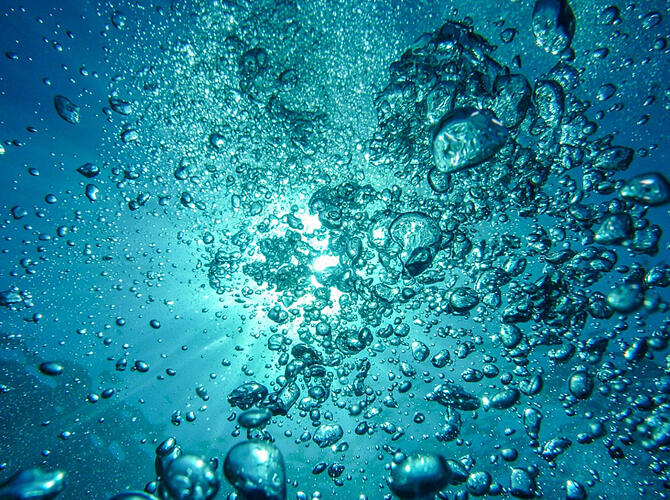International science research led by the Laboratory of Applied Bioacoustics (LAB) at the Universitat Politècnica de Catalunya (UPC), Barcelona, Spain, has shown that the noise generated by human activities in the ocean damages marine invertebrates and marine ecosystems. An article published in Frontiers in Marine Science reported that noise pollution in the ocean can lead to even the death of some marine organisms.

Over the past few decades, scientists have studied the noise sensitivity of marine mammals known to possess hearing organs, particularly cetaceans, pinnipeds (the family of seals and sea lions) and fish. Recent studies revealed that a variety of invertebrates also perceive sound, and that their receptors are sensory organs responsible for maintaining body equilibrium and gravity perception. Invertebrates represent the largest proportion of marine biomass. These organisms serve as indicators of ocean health, and many species have important socioeconomic value.
A team of scientists comprised of researchers from UPC, universities and research centers in Australia, Spain, the United States of America, France, Japan (Chuo University and the Ocean Policy Research Institute, the Sasakawa Peace Foundation), Italy, New Zealand and the United Kingdom has reviewed the results of numerous studies on the impact of noise on marine invertebrates such as crabs, mollusks, squids, prawns and worms. The results revealed that anthropogenic noise from human activities harms these species in various ways, from the cellular to the ecosystem level.
"Many people are surprised to learn that invertebrates can perceive sound, but the sound is indeed essential for their survival," explained LAB researcher Marta Solé. "Light does not travel very well through water, but sound does. Invertebrates use sound to perform vital activities such as interspecies communication, predator detection and reproduction. Human activities, particularly ship navigation, are rapidly altering the acoustic environment of the ocean. This study summarizes the latest evidence on these impacts."
The published paper warns of the various impacts of noise pollution on invertebrates, including delayed hatching and development of eggs, along with significant increases in abnormal larval development rates and mortality rates in crustaceans, bivalves (mussels and oysters), gastropods (snails) and cephalopods (cuttlefish and squids). Low‐frequency sounds, such as those produced by underwater explosions, can injure and even lead to the death of blue crabs. Long‐term exposure to noise can also have an impact on the behavior of these species. Ship noise limits the ability of the European green crabs (Carcinus maenas) to change their body color to camouflage themselves. After exposure to noise, the common cuttlefish (Sepia officinalis) showed changes in their protein content, primarily associated with structure and stress.
Studies have also demonstrated physiological changes in some species, including significant reductions in growth and reproduction rates, increased aggressiveness and mortality rates, and reduced feed intake. Recent studies revealed that various invertebrates perceive sound, specifically using statocysts. Because the density of water is greater than that of air, sound travels approximately five‐fold faster in water (around 1,500 meter/second (m/s)) than in air (around 340 m/s) and is less attenuated in water over the same distance.
Invertebrates detect underwater sound using three types of sensory systems: ciliated receptors on the body surface, statocysts and chordotonal organs attached to the antennae or joints of legs in crustaceans. Invertebrates can also produce sounds through numerous mechanisms, from the coughing of scallops to stridulation, in which lobsters, crayfish, prawns and crabs rub their body parts together as if bowing a violin in an attempt to repel predators.
The paper describes all forms of sound production and perception that are unique to invertebrates and the techniques used to analyze them. Noise can affect entire ecosystems by altering the predators‐prey behavior and health in complex food webs. Invertebrates play important roles in ecosystems such as water filtering, habitat creation, organic matter processing and carbon transfer through food webs and nutrient recycling.
Further research in this field is necessary to mitigate the impacts of noise pollution in the ocean. "Our study highlights that these animals exist in a rich underwater acoustic environment," explained Dr. Sophie Nedelec from the University of Exeter. "There is a need for more information about the impacts of noise pollution on these animals and ecosystems. Given that noise affects invertebrates from the cellular to the ecosystem level, we must bring together interdisciplinary expertise to embrace a holistic vision of the problem. Considering the many anthropogenic pressures, such as climate change and fishing, it is imperative that every effort is made to limit underwater noise."
This article has been translated by JST with permission from The Science News Ltd. (https://sci-news.co.jp/). Unauthorized reproduction of the article and photographs is prohibited.




